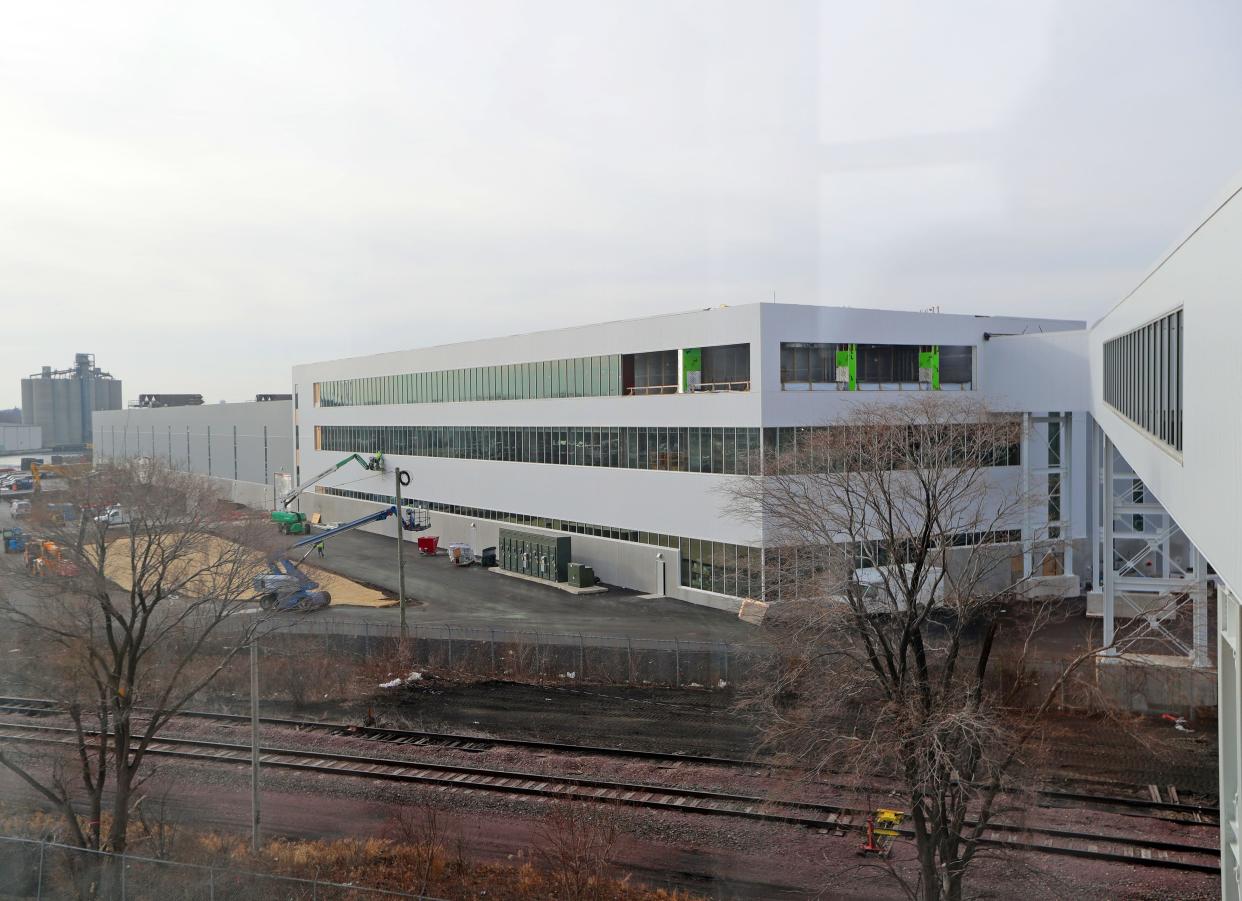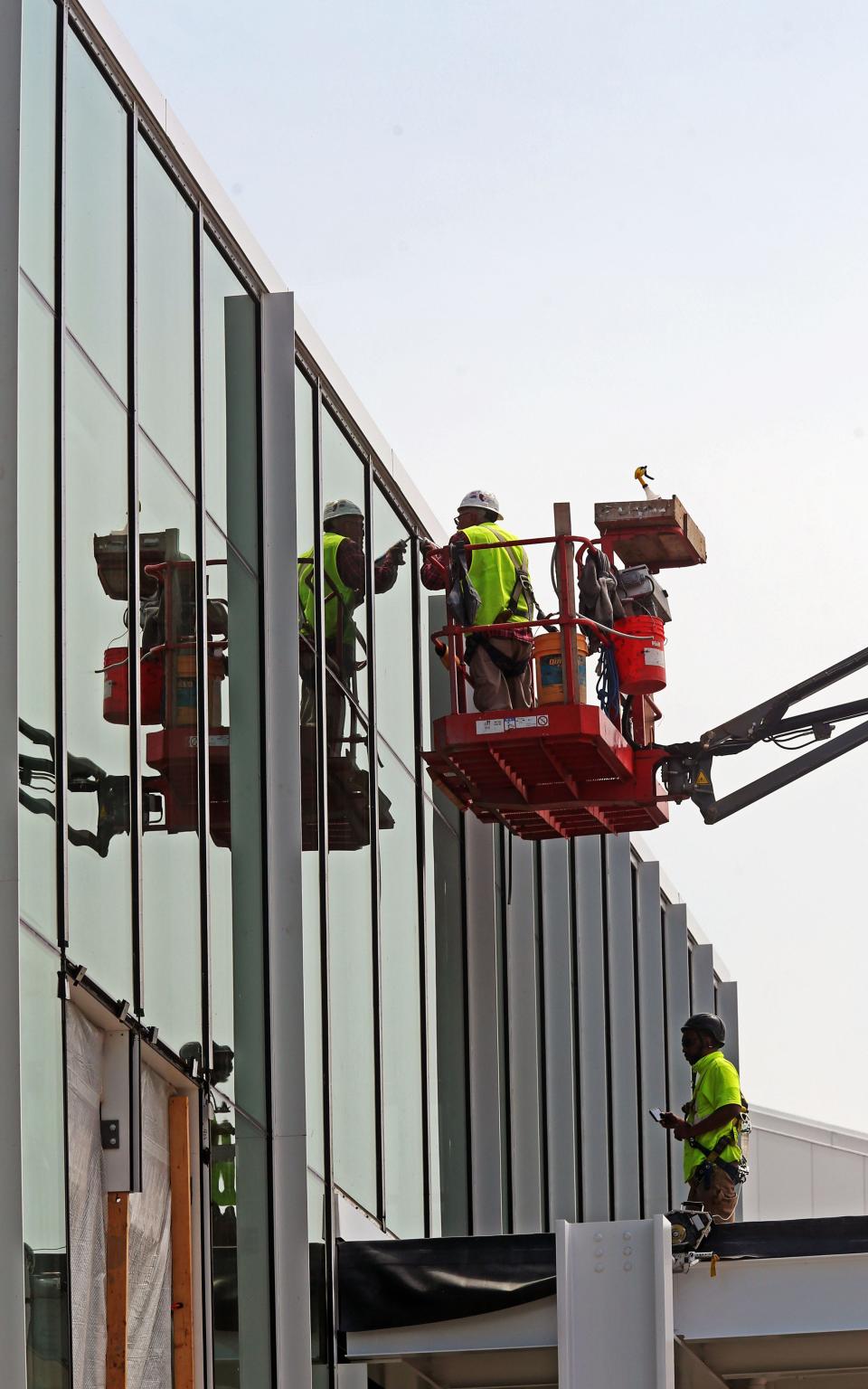Federal infrastructure bill presents opportunities for minority businesses if there's a commitment from general contractors

The $550 billion federal infrastructure bill, signed into law last November, has the potential to provide significant boosts in business for minority contractors - but it will take persistence.
Ugo Nwagbaraocha is president and owner of Diamond Disc International, a wholesale construction, tooling and equipment. He is also president of the Wisconsin chapter of National Association of Minority Contractors.
“If we truly want this infrastructure bill to impact not only ethnic diverse businesses but also the communities, the underserved, underrepresented communities which we’re most often a part of, then we have to be more intentional and meaningful in making sure that there are provisions that encourage and motivate (general contractors) to use ethnic diverse businesses,” Nwagbaraocha said.

Nwagbaraocha and NAMC are concerned that ethnic minority contractors and disadvantaged business enterprise will be left out of the financial windfall created by the infrastructure legislation.
“Sometimes 70% to 80% of their current DBE participation is non-minority women owned firms,” Nwagbaraocha said of some projects.
“It’s great for non-minority women owned firms to be doing well, but there’s a concern that ethnic diverse businesses that disparity of our participation on these major projects, will increase if there’s not intentional efforts made to continue to increase participation opportunities.”
The difference between white and minority contractors getting bids on jobs is “a gaping disparity that needs to be addressed,” Nwagbaraocha said.
“There are ethnic diverse businesses that are normally really good at doing some kind of niche market, and often times they’re able to do that niche market even better than some of the bigger firms that are out there because that’s all they do,” Nwagbaraocha said.
“Then when a prime (contractor) would say, ‘We want you to do this and this,’ but then they’ll also bundle in two or three different types of services. That, often times, would be where the ethnic diverse firm was not as competitive.”
As an example, Nwagbaraocha said there might be a general contractor working on a $5 million project that may have diversity requirements or goals but can get a “good faith waiver” if they can't find diverse subcontractors.
“It was something that became a tool that became over-utilized and mis-utilized, and it became an excuse for firms not to seek and or utilize diverse firms on projects,” Nwagbaraocha said adding he and NAMC worked to revise ASP3 (additional special provision 3) with the Wisconsin Department of Transportation, which addresses disadvantaged business enterprise program implementation.
Nwagbaraocha said the ASP3 revision became more structured and it became more difficult for firms to avoid hiring minority contractors.

$70 million to DBE firms from Komatsu
One recent project that can show the potential a single, large project can have on minority contractors is the Komatsu Mining Harbor District project at 401 E. Greenfield Ave.
Hunzinger Construction Company is the construction manager of the $285 million project and helped funnel $70 million to diverse firms working on the project and exceeded its goal of having 25% of the subcontractors working on the project from minority firms.
“That doesn’t happen by sitting back in the chair and saying ‘This is tough. We can’t do it,’ and making excuses. You have to work at it proactively,” said Joan Zepecki, director of corporate affairs, and equity and inclusion coordinator for Hunzinger Construction Company.
Zepecki said Hunzinger 38% of the subcontractors on the Komastu project were disadvantaged business enterprises.
“There are some very, very good diverse firms that we work with, that we would work with whether there were requirements or goals or not,” Zepecki said.
“They’re just part of our subcontractor stable... Hunzinger, as a company, has had direct subcontracts with minority firms over those years that total over $550 million.”
Zepecki said there has been hope for minority companies in construction to become more successful, but the 2008 recession killed many small businesses.
“That included a lot of diverse businesses,” Zepecki said. “We’re seeing diverse businesses and smaller businesses building back. So, whenever these opportunities come forth, it’s always great news.”
Zepecki said the federal government could learn from the private sector as to how to include minority contractors.
“Sometimes the private project goals take it more seriously than the federal government does,” Zepecki said. “I think our city of Milwaukee does a really nice job making sure people understand that the goals are important. But on the federal level it’s bureaucracy and that doesn’t always happen.”
On Wednesday, Amit Bose, administrator for the Federal Railroad Administration, along with Secretary of Transportation Pete Buttgieg, announced 46 rail projects across the country were going to be funded, at least partially, with $368 million in Consolidated Rail Infrastructure and Safety Improvements grants.
Bose said he hopes these grants provide opportunities for minority and small business contractors.
“FRA right now is looking to establish our own disadvantaged business enterprise program that we know has a lot of interest in congress,” Bose said. “In addition to that we continue to look at the workforce of the future to make sure that the railroad industry is reflective of the country and there is a workforce development grant for Amtrak to create opportunities in their mechanical engineering department.”
Josh Levy, an attorney with Husch Blackwell, said the law firm is offering pro-bono services and legal advice to help minority business.
Levy said Husch Blackwell developed the Cream City Conference and Small Business Accelerator designed to “give quick hits of information that’s helpful in the backroom of a developing business.”
“Our roundtable was made up of government officials, it was made of lenders, accounting, insurance law and then field contracting companies,” Levy said. “And we need to have more opportunities for that variety of people in the construction space to just get together.”
Levy said businesses need to leverage the opportunity presented by the infrastructure bill.
“The infrastructure bill is really an opportunity, I believe, to jump start what has been a historic structure in opportunity to have some mentor-protégé relationship in construction to lift small businesses,” Levy said, adding that in the bill requires 10% of the contract work to be used on disadvantaged business enterprises.
“There is a recognition of ‘Let’s not just stimulate the infrastructure, let’s stimulate small business and construction.’”
Our subscribers make this reporting possible. Please consider supporting local journalism by subscribing to the Journal Sentinel at jsonline.com/deal.
DOWNLOAD THE APP: Get the latest news, sports and more
This article originally appeared on Milwaukee Journal Sentinel: Infrastructure bill gives opportunities for minority contractors

